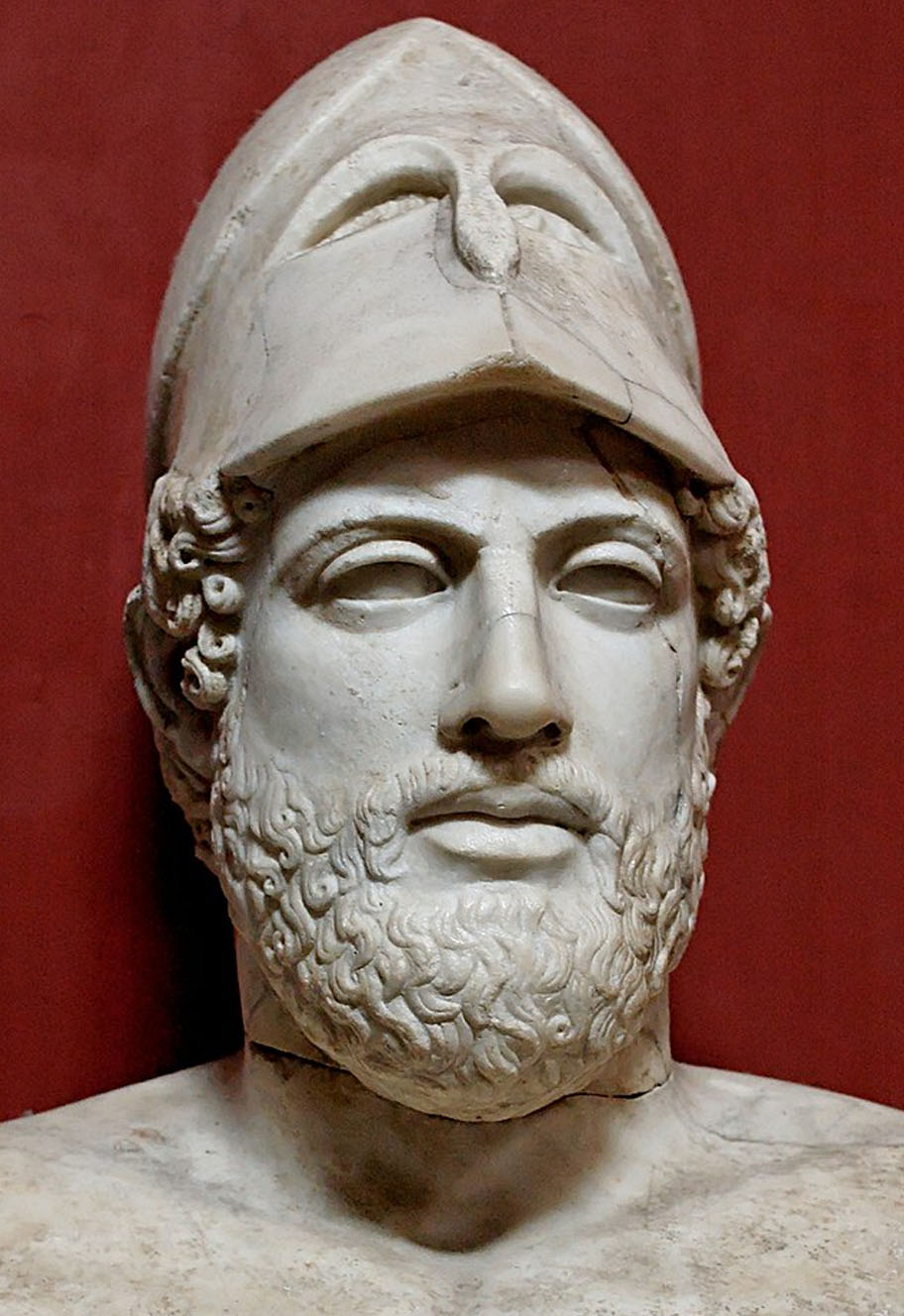Pericles
Born:
C. 495 BCE
Died:
429 BCE
Pericles was a prominent and influential statesman and general in ancient Greece, particularly known for his role in the city-state of Athens during its Golden Age. He played a key part in shaping Athenian democracy, promoting the arts and culture, and leading Athens during the early years of the Peloponnesian War. Here are key aspects of Pericles's life and contributions:
Early Life: Pericles was born into a noble family in Athens around 495 BCE. His mother, Agariste, was a member of the powerful Alcmaeonid family, and his father, Xanthippus, was a notable general. He received an education in philosophy and rhetoric, studying under the philosopher Anaxagoras and the famous orator and statesman Damon.
Political Career: Pericles rose to prominence in Athenian politics, becoming a key figure in the democratic government. He was known for his eloquence and persuasive speaking skills, earning him the nickname "Olympian" for his god-like ability to sway the masses. He entered politics around 463 BCE and held various offices, including the position of strategos (general) for several terms.
Leadership in Athens: Pericles played a central role in the development and consolidation of Athenian democracy. He expanded the power of the popular assembly, allowing greater citizen participation in decision-making. Under his leadership, Athens became a centre of culture, philosophy, and the arts, with notable figures such as the playwrights Aeschylus, Sophocles, and Euripides and the philosopher Anaxagoras flourishing during this period.
Peloponnesian War: Pericles led Athens during the early stages of the Peloponnesian War (431–404 BCE), a conflict between Athens and the Peloponnesian League led by Sparta. His strategy focused on the strength of Athens' navy and the use of the city's long walls to connect it to the port of Piraeus, ensuring a secure supply route during sieges. Unfortunately, Pericles's strategy couldn't prevent the outbreak of a devastating plague in Athens in 430 BCE, which claimed his life in 429 BCE. His death was a significant blow to Athens, as he had been a stabilising force and a charismatic leader.
Funeral Oration: Pericles is famously associated with the Funeral Oration, a eulogy delivered in honour of those who died in the first year of the Peloponnesian War. The speech is recorded by the historian Thucydides in his work "History of the Peloponnesian War." In the oration, Pericles extolled the virtues of Athenian democracy and the sacrifice made by those who died in defence of the city-state.
Cultural Contributions: Pericles supported and patronised the arts, contributing to the flourishing of literature, drama, philosophy, and architecture in Athens. He encouraged the construction of the Parthenon on the Acropolis, a monumental temple dedicated to the goddess Athena, which became a symbol of Athenian power and culture.
Legacy: Pericles is remembered as one of the most important figures in ancient Athens, credited with shaping and strengthening the democratic system. His leadership during the Golden Age of Athens left a lasting impact on the city-state's cultural achievements and political structures.

Quick Facts
- Pericles is famously associated with the Funeral Oration, a eulogy delivered in honour of those who died in the first year of the Peloponnesian War.
- He played a central role in the development and consolidation of Athenian democracy.
- Pericles' strategy in the Peloponnesian War focused on the strength of Athens' navy and the use of the city's long walls to connect it to the port of Piraeus.
- Despite the challenges Athens faced, Pericles's legacy endures as a symbol of the ideals of Athenian democracy and the cultural achievements of the Golden Age.
Further Reading
Art &
Architecture
Ancient Greek art and architecture, with its harmonious proportions and timeless elegance, continue to inspire awe and admiration millennia later.
Discover
Greek Mythology & Mythical Characters
Greek mythology, a rich tapestry of gods, heroes, and mythical creatures, captivates the imagination with its tales of love, betrayal, and epic adventures that delve into the depths of the human psyche.
Discover
Ancient Greek History
Ancient Greek history, marked by remarkable achievements in democracy, philosophy, and warfare, shaped the foundation of Western civilization, leaving an indelible legacy of innovation and cultural influence that continues to resonate to this day.
Discover
Ancient Greek Olympics
The ancient Greek Olympics, held in Olympia every four years, celebrated athleticism, unity, and cultural pride, serving as a testament to the enduring spirit of competition and excellence that transcends time and borders.
Discover
Ancient Greek Wars
Ancient Greek wars, such as the Persian Wars and the Peloponnesian War, were pivotal conflicts that shaped the course of history, highlighting the struggle for power, independence, and the clash of civilizations in the ancient Mediterranean world.
Discover
Ancient Greek Culture and Society
Ancient Greek culture and society, characterized by its emphasis on art, philosophy, and civic engagement, fostered a vibrant intellectual and social landscape where innovation flourished, democracy thrived, and the pursuit of knowledge and excellence was celebrated as fundamental values of civilized life.
Discover